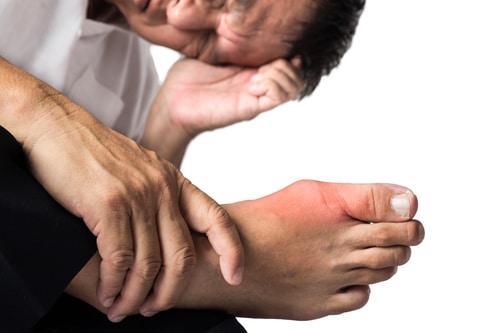Overcoming A Gout Flare-Up
If you were to ask anyone who suffers from gout, they would tell you the worst pain to experience is a gout flare-up.
My dad suffers from gout. I can remember when I was in high school and he was initially diagnosed. He went to bed one morning feeling fine. He woke up the next morning and couldn’t even put pressure on his foot. It was baffling.
Now that I’ve been a nurse for ten years, I’ve seen some pretty intense things and seen grown men cry because they’re in excruciating pain. Still, some people have told me that gout pain rates high on their list.
So, here are four tips that I’ve compiled – from my professional experience and from my personal experience – that can help you get through a flare-up.
Take Your Meds
Remember when you were handed a prescription for pain medication or told to pick up a certain pain reliever from the drugstore? You were probably given explicit instructions on how to take those medications so as to reduce the pain.
Well, pull those instructions out or better yet, call your doctor.
Several medications are often prescribed to treat pain associated with gout:
- Nonsteroidal anti-inflammatory drugs (NSAIDs) such as ibuprofen and naproxen. These can be purchased over-the-counter. They reduce pain while also lower the inflammation at the joint.
- Your physician may also order NSAIDs that require a prescription, such as indomethacin.
- Colchicine can also be given at the onset of a flare-up, but is not a pain medication, per se. According to WebMD, it is thought to “…work by decreasing swelling and lessening the build-up of uric acid crystals that cause pain in the affected joint(s).” Colchicine is given at a small dose and titrated up, and can also be given as a daily medication to prevent gout flare-ups.
- Corticosteroids, like prednisone, can be given as a pill or injection if the pain doesn’t respond to NSAIDs or colchicine.
Get Your Rest
When you were diagnosed with gout, it is likely your doctor spouted off on the importance of adding exercise to your life. After all, exercise can improve the mobility of the affected joints and reduce weight, both of which are beneficial if you have gout.
So why am I recommending that you rest if you are having a flare-up of your gout?
Try to remember when your physician told you what causes gout – your pain is essentially caused because uric acid crystals are building up in your joints. When you move your joints, your joints are moving against the crystals, which is what is causing the pain.
When you are in a “normal” state, you do not have the uric acid crystal buildup. I would strongly encourage an exercise routine at that time.
When you have a flare-up, the build up will cause inflammation. Rest is crucial for the inflammation to reduce – so you have permission to have a Netflix marathon!
Apply Ice
Applying ice to the affected joint is another great way to decrease pain immediately.
This method will not cause the pain to go away indefinitely, at least not until the uric acid crystals have had a chance to resolve themselves, but they can temporarily reduce pain.
To do so, just apply an ice pack (or any frozen food) to the affected joint. It is recommended to wrap the ice or frozen food in a dish towel – this will create a barrier so that you do not place the ice directly on the skin.
Drink Extra Fluids
Dehydration can trigger a gout flare-up to occur. Why? When there are fewer fluids in the body, the amount of uric acid in the body increases. When the uric acid levels rise, the kidneys cannot keep up.
When you’re in the midst of a gout flare up, it is wise to increase your fluid intake. This includes drinking an adequate amount of water, especially when exercising or when it is hot out.
Not only can this prevent a gout flare up from occurring, but it can also help to “rinse out” the crystals from the body during a flare up.
So there you have it – four tips to get you through a gout flare-up!
References
Arthritis Foundation (Managing a Gout Attack)
WebMD (Your Gout Triggers)
Author Bio:
Krystina Ostermeyer is a practicing RN who also enjoys writing about health and wellness. She has a varied nursing background and is currently working as a diabetes educator. She lives in a small town with her husband and two-year-old son. You can find more of Krystina’s writing on NewLifeOutlook.

